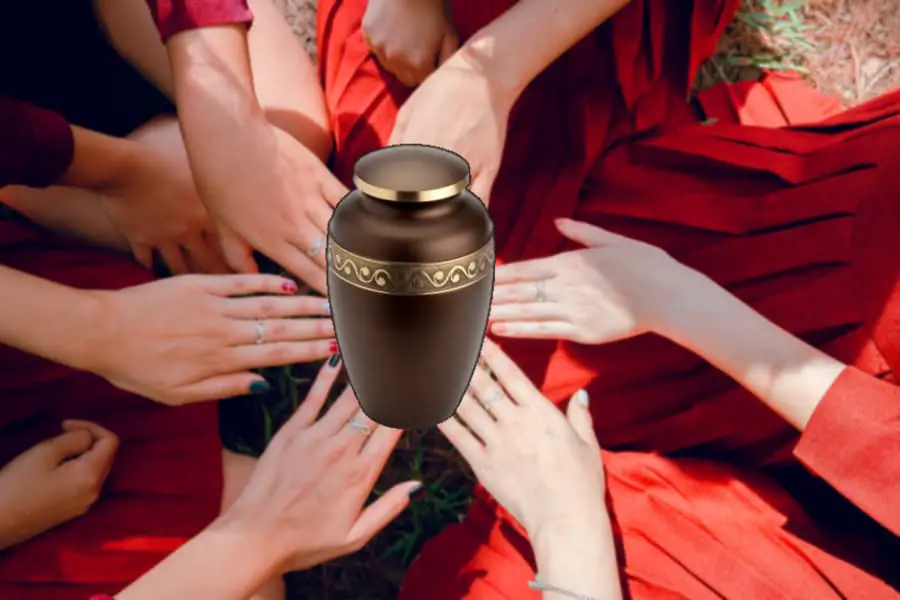Although the right to collect a body’s ashes after cremation will usually go to the surviving relatives or an executor, disputes over a body’s remains are complex and sometimes cannot be resolved by law.
Sometimes it’s just as simple as a scheduling conflict or the fact that the closest person to the deceased isn’t related by blood.
So, can anyone legally collect ashes from a funeral director?
Legally the deceased’s executor stated in a will, or a near relative will be given the legal right to collect the ashes. Without a will, the legal right depends on a certain hereditary hierarchy. A near relatives’ rights to the body or ashes are therefore dependent if there was a will left behind.
If you are trying to find out whether or not you can claim the earthly remains of your loved ones, you’ve come to the right place.
I have don’t my research and found out everything I can about the rights you have as a friend or relative to collect ashes from a funeral home.

Rules and regulation of collecting human remains in the US
According to Forbes, nearly half of all Americans over the age of 55 have not yet created their will which means that a large proportion of deaths end in confusion over who is responsible for the deceased’s estate and after death care.
Of course, if a will was made, then the situation is much easier to deal with despite the grief over the passing of a loved one. Unfonutalely, this is only an issue which seems to be becoming more prevalent.
Death without a will (who is in charge?)
Upon the death of a married person without a will, the surviving spouse or civil partner has the right to the remains of the deceased. If there is no surviving relation or if the next of kin wavered their rights, these rights will go to the next closest person ( State of Weiss, 2009 Phila. Ct. Com. Pl. LEXIS 236 (Pa. C.P. 2009).
Order of precedence in the United States
- The executor appointed in the deceased’s will.
- The surviving spouse
- Surviving children
- Surviving grandchildren
- The parents of the deceased
- Blood-related brothers and sisters
- Blood-related nieces and nephews.
- Grandparents
- Any person having a beneficial interest in the estate will be next in line if there are no relatives.
It is important to note that the laws regarding next of kin do not make any difference between a person’s biological relations and adoptive relations. Adoptive children and biological children have equal rights. Adoptive families are also treated the same as biological ones.
In certain cases, the rights of next of kin can be wavered by consent if there is strong enough reason to do so. For example, in the case of mental instability, or if the executor or next of kin does not promptly claim their rights, the rights can be waived by consent.
Issues over hereditary claims to human remains
In general terms, the law in the USA gives the responsibility of preparing a body for burial or cremation to their living spouse. This is, of course, the ideal situation in legal terms.
However, all families are different, and this makes the order of entitlement to a deceased’s remains a complex one, and at times difficult to resolve by law. Common disputes such as the divorced or separated parents of a deceased child, or the children of a parent who did not appoint an executor in their will, can result in conflict and even unclaimed ashes.
Additionally, the executor or near relative has the right to make the funeral arrangements and make decisions regarding the final resting place of the body, but if there is a dispute this can be put on hold, resulting in further complications and rifts within a family.
An executor also doesn’t have to act in the best interests of the family and if there are no burial wishes in the deceased’s will, the family is bound by the hierarchy stated by law, which may not always be completely fair. Courts are reluctant to get involved with an executor’s decision, leaving the family to find a way to compromise alone.
Furthermore, although the ashes may not be retained by the funeral director in the case of an unpaid bill, funeral directors are obliged to follow the instructions of the client who lodges the application and who pays for the cremation. If the person who applies or pays for the cremation is not the deceased rightful executor, conflict may arise in the family.
Conflict can arise when family members have different views and opinions, and it can be extremely difficult to settle. If there are no disagreements or complications regarding the remains of the deceased, then the law is clear.
However, all families are different and their circumstances surrounding a death are not the same. Sometimes, a waiver can be signed by consent if the executor is mentally unstable or if they are too slow to take up their responsibilities, but more than often there is no easy solution to the disagreement. What is important is solving the issues as fast as possible so that people can grieve without having to deal with the stress of a family feud, or the cost of a lawyer.
Review the laws for your state on Nolo.com or Coieo.com
What happens if the ashes are uncollected.
There are 23000 funeral homes across North America who all have the issue of uncollected ashes. Some have been forgotten, some families are just unsure what to do with them, while others are uncollected because of family disputes.
In Most U.S. states a funeral home is required to hold ashes for four years but many homes will keep them for longer. Some, however, do take things into their own hands and will scatter them themselves after the required time they have to keep them. They will always keep records however of where the remains were scattered and Funeral Directors are required to reach out to the families related to the deceased.
On the rare occasion that a funeral home has proceded this far without payment, the family of the deceased cannot expect that they will not claim the fee they are due. Therefore, not claiming the remains of a deceased person in no way constitutes a free funeral and may actually result in legal action against the grieving family.
Can human remains be property?
According to state law, human remains cannot be property. Just as the body belonged to the person in life and can’t be owned, its remains can’t be owned in death and should be treated with respect and reverence. The executor holds the ashes for burial, however, the executor does have the final say as to how the ashes are disposed of and the courts are reluctant to get involved with burial decisions.
How to deal with family disputes over collecting ashes.
The best way to deal with a dispute in the family during a time after the death of a loved one is to try and talk things through. If you can all learn to compromise you will save time and money. This is especially true when you want to dispose of the earthly remains of a loved one in a dignified and respectful manner.
How to communicate:
Death and grief (Speak to a professional today from the comfort of your home) can make people feel the loss of control and some family members may feel that they need to regain control by controlling what happens to the body and its remains. If this is the case, you can try to get the person to feel in control by giving them something important to do regarding the deceased. You can then try to explain how their behavior is affecting the family. You may feel they become more open-minded.
Planning is also important. If there is no communication or planning within a family after a death, there will be a lot of uncertainty and misunderstandings will arise. Sit down together, discuss things and make sure everyone is on the same page. Always give feedback.
When in a heated discussion where feelings are running high, change using the word ‘you’ to using ‘I’. For example, instead of saying “ You always try to control everything and do whatever you want!’ you could say, ‘ I feel hurt and left out when you make decisions without including me.’
Know when to seek professional help and assistance, sometimes trying to talk things through just won’t work. There are services you can hire to work with the family and to help everyone find a way to compromise.
Lastly, if the issue is serious or has been dragging out for too long, you may need to hire a lawyer. Remember that if human remains aren’t collected within 4 years of cremation then most American funeral homes have no legal obligation to hold onto them!
Related questions.
What is the cremation process?
The cremation process reduces the body to bone fragments by exposing the body to intense heat and flames in a cremation chamber for about two hours. The remains are later ground into ‘cremains’ which what we call ashes.
What can you collect human ashes in?
Ashes are stored in a plastic bag which is put into a basic contained the size of a large vase. This will be given to you so there is no need to bring a container. You can also purchase an urn from your funeral home, but often it’s cheaper to buy your own (check out the affordable selection on OneWorld Memorials).
What should we bring when we collect the ashes?
You will need to take your ID as identification. The payment will be discussed with the funeral director.





